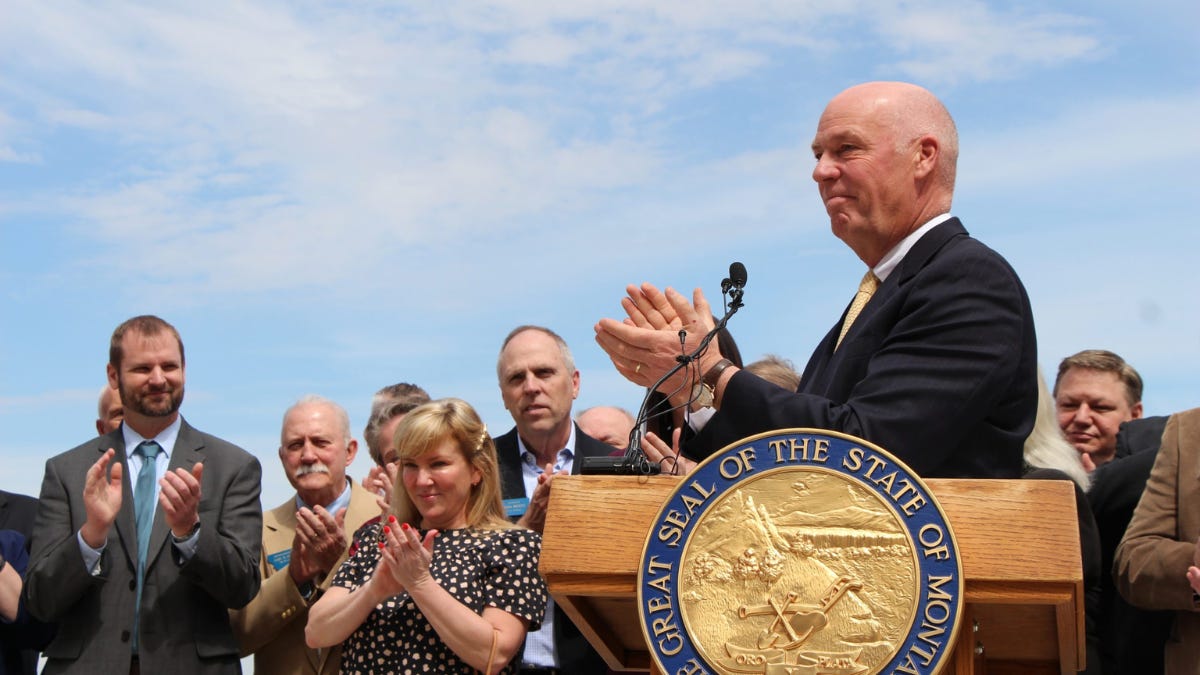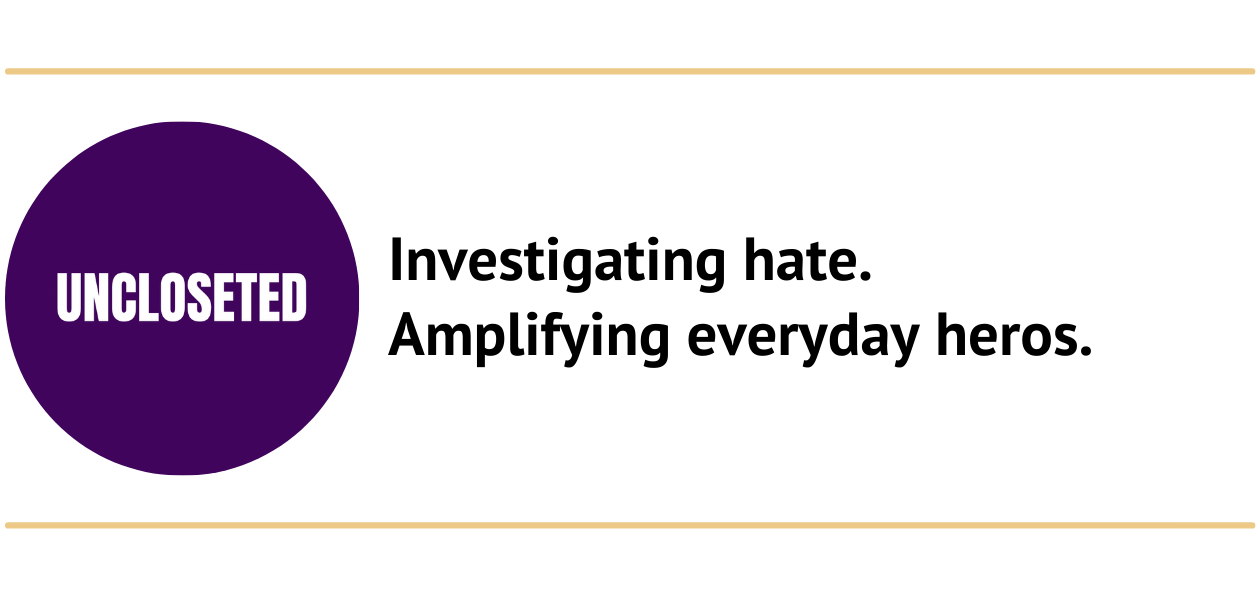Montana Governor Signs Bathroom, Trans Athlete Restrictions into Law
The bills, which sparked legal action Thursday, are part of national wave of legislation advancing strict ideas of gender identity
Maria Silvers, Montana Free Press.

Republican Gov. Greg Gianforte on Thursday signed two bills restricting transgender Montanans’ access to public bathrooms and locker rooms and participation on athletic teams, sparking legal action from civil rights advocates against one of the new laws slated to go into effect immediately.
The news came from the governor’s office via a press release in the early afternoon and an accompanying video posted to the social media platform X. There, Gianforte said the legislation would help “safeguard fairness, privacy, and security” in sports and public places.
“Over the last few years we’ve seen far-left gender ideology sweep the nation,” Gianforte said. “But here in Montana we’ve stood up against this radical agenda and maintained equal opportunity for all Americans while also protecting women and girls.”
House Bill 121, which affects public bathrooms, locker rooms and sleeping areas, in addition to those residing at domestic violence shelters, was written to take effect immediately upon being signed into law. House Bill 300, pertaining to student athletes in K-12 and university settings, is not slated to take effect until Oct. 1.
An attorney for the ACLU of Montana said the organization filed a lawsuit Thursday afternoon against HB 121 on behalf of transgender and intersex plaintiffs. The same-day lawsuit was prompted by the law’s immediate effective date, the attorney said.
“This is yet another attempt to demonize and marginalize transgender Montanans and we won’t stand by idly,” said Alex Rate, the organization’s legal director.
Both bills saw broad support from legislative Republican lawmakers, reflecting how the issue of strict gender roles has become a cornerstone of the state and national GOP in recent years.
Gianforte’s Thursday announcement was lauded by national groups including the Alliance Defending Freedom and Independent Women’s Voice, which has advocated for similar gender bills in other states.
Throughout committee hearings and debates, backers of both bills consistently sidestepped opponents’ allegations they intended to restrict the lives and expression of transgender people. Rather, supporters described cisgender women feeling uncomfortable or threatened when in close proximity to transgender people in vulnerable spaces, such as locker rooms and dormitories.
Supporters also described the hypothetical situation of predatory, cisgender men masquerading as women for the purpose of invading public spaces, an argument that Democratic lawmakers and transgender opponents panned as disingenuous and fearmongering.
“We have trans people in our communities. We have trans people who are employees, who are students. We have trans people who face abuse and come to the shelter,” said Rep. Zooey Zephyr, D-Missoula, the first openly transgender woman to serve in the Montana Legislature, during a January debate over HB 121. “‘This is not an issue’ is what was said again and again by the people impacted on the ground.”
The plaintiffs in the ACLU lawsuit include two state employees, a political intern for the Montana Democratic Party who works at the state Capitol building, and an accessibility coordinator at Helena College, a public university, all of whom are transgender or do not identify as either gender. Another plaintiff is intersex and, because of his biological characteristics, does not know whether HB 121 classifies him as “male” or “female.”
The law creates a route for legal action against any public facility — including jails, schools and government buildings — or domestic violence shelter that do not take steps to ensure that multi-user bathrooms or locker rooms are sex-segregated based on chromosomes and reproductive biology.
In court filings, attorneys for the ACLU of Montana said the law presents plaintiffs with impossible choices about how to navigate public spaces where they work, as well as public parks and libraries.
“Discomfort with or dislike of transgender people cloaked as a privacy or safety concern is not a legitimate basis for imposing unequal or stigmatizing treatment,” attorneys wrote in the brief for a temporary restraining order.
Rate added that the ACLU of Montana did not have an immediate plan to challenge HB 300, the prohibition on athletic participation, though he said the latter bill “suffers from the same constitutional infirmities” as the bathroom ban.
Lawmakers from both parties this session questioned how HB 300 is legally distinct from prior bills that sought to restrict student sports participation. A bill from 2021 was struck down as it applied to colleges and universities after a judge found it infringed on the role of the Montana Board of Regents. Another bill that sought to institute strict definitions of “sex” across Montana law was found unconstitutional in February based on equal protection and privacy violations.
Supporters pointed out that HB 300 amends a broader, preexisting section of law that prohibits discrimination in education. They also said the policy is in line with the federal government’s stance on interpreting gender discrimination, an analysis that has flipped between the administrations of former Democratic President Joe Biden and current Republican President Donald Trump. The NCAA has also recently changed its protocols for transgender athlete participation, under pressure from the Trump administration, requiring participation to be based on sex assigned at birth.
In an emailed statement, a spokesperson for the Office of the Commissioner of Higher Education told Montana Free Press that it is anticipating minimal issues with complying with both laws.
“A preliminary review of campus bathroom facilities shows that minimal effort will bring our campuses into compliance,” said Galen Hollenbaugh, deputy commissioner for government relations and communications.
Regarding HB 300, Hollenbaugh said, the Montana Board of Regents policy requires the Montana University System to “comply with NCAA regulations.”
“Following a presidential Executive Order, the NCAA has revised the relevant regulations regarding trans athletes, neutralizing any MUS compliance issues with HB 300,” Hollenbaugh said.
If objective, nonpartisan, rigorous, LGBTQ-focused journalism is important to you, please consider making a tax-deductible donation through our fiscal sponsor, Resource Impact, by clicking this button:




